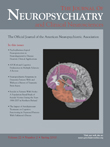Non-Pharmacological Treatments in a Patient with Dementia Due to Huntington’s Disease
To the Editor: Huntington’s disease is a disease with multiple CAG repeats and autosomal-dominant inheritance on chromosome 4p16. 1 There is still no effective treatment for this disease. 2 Moreover, patients with Huntington’s disease can be sensitive to psychotropic medications such as antipsychotic agents, including dopamine antagonists and serotonin-dopamine antagonists. 2 However, the use of nonpharmacological treatments might reduce the need for psychotropic drugs. 3 Here we present the case of a woman with Huntington’s disease who received nonpharmacological treatment in our day hospital.
Case Report
The patient was a 51-year-old woman with a history of good health and 9 years of education. She functioned well as an accounting assistant for 20 years. In recent years, she suffered from insomnia and had difficulty standing and balancing; in addition she experienced mild impairment in the activities of daily life. Assessment of her Mini-Mental State Examination (MMSE) was 16, and her Activities of Daily Life (ADL) score was 60. Chorea was also significantly present. Our neurologist diagnosed Huntington`s disease based on genetic test results. After the diagnosis was made, the patient experienced a severe major depressive episode accompanied by a suicide attempt. Sometimes the patient exhibited aggressive behaviors. Following combined therapy of an antidepressant and an antipsychotic agent, her mood gradually improved and the aggressive behaviors diminished. After 3 weeks of hospitalization, the patient was discharged in a stable mood.
The patient’s husband complained of her restlessness (akathisia) and irritability; moreover, he was concerned about side effects of her medications and asked us to change her prescription (risperidone, 2 mg/day, and lamotrigine, 100 mg/day). As the patient complained of dry mouth, body weight gain, and poor tolerance to the newer medication (olanzapine, 10 mg/day, and lamotrigine, 100 mg/day), we reverted to her previous regimen.
The patient’s husband continued to monitor her mental condition 24 hours a day. As we were anxious that he would experience burn out, we admitted the patient to our dementia day care unit (MMSE score =10 and Neuropsychiatric Inventory [NPI] score =64). Nonpharmacological treatments in the dementia day care unit included a well-designed schedule of behavior therapy, reminiscence therapy, and art therapy. After 2 months, her MMSE score remained the same and NPI was 21. Furthermore, the patient’s psychotropic medication was decreased to risperidone, 1 mg/day, and lamotrigine, 50 mg/day, with no obvious disturbing behaviors.
Discussion
This case report demonstrates the therapeutic effects of nonpharmacological treatments in Huntington’s disease. Caregivers of Huntington’s disease patients often complain of their disturbing behaviors, psychotic symptoms, and depressed mood, rather than cognitive impairments. 3 This could explain the beneficial effects of dementia care in our day hospital. Reduced use of psychotropic medications also might be effective. As sensitivities to psychotropic drugs, including antipsychotic agents, are the most important limitations in the treatment of Huntington’s disease, nonpharmacological treatments could play an important role in the treatment program of Huntington’s disease. Integration of pharmacological and nonpharmacological treatments in future studies would be valuable for patients and their families.
1. Landles C, Bates GP: Huntingtin and the molecular pathogenesis of Huntington’s disease: fourth in molecular medicine review series. EMBO Rep 2004; 5:958–963Google Scholar
2. Bonelli RM, Wenning GK, Kapfhammer HP: Huntington’s disease: present treatments and future therapeutic modalities. Int Clin Psychopharmacol 2004; 19:51–62Google Scholar
3. Forbes DA: Review: sparse evidence supports non-pharmacological interventions for preventing wandering in people with dementia. Evid Based Nurs 2007; 10:15Google Scholar



